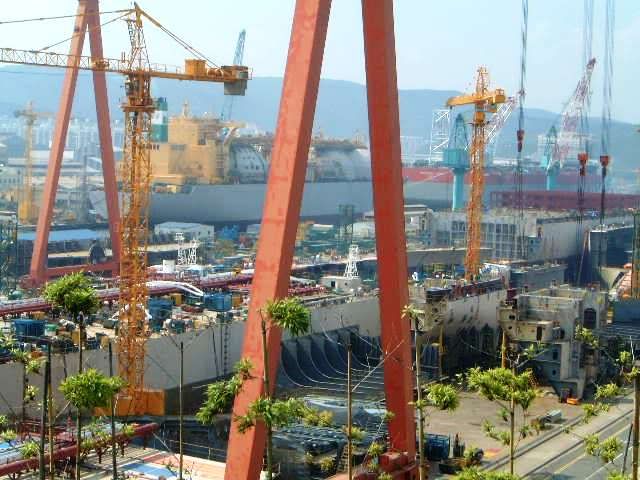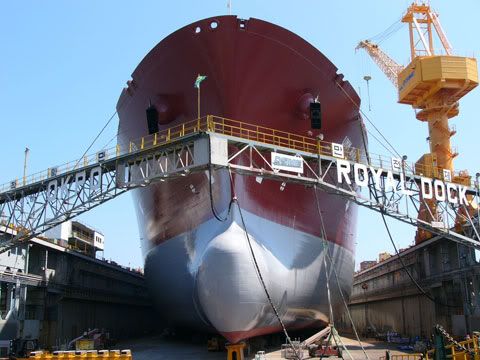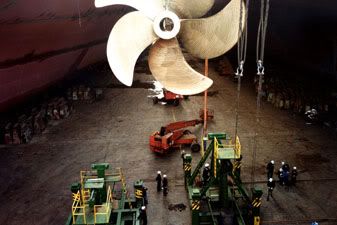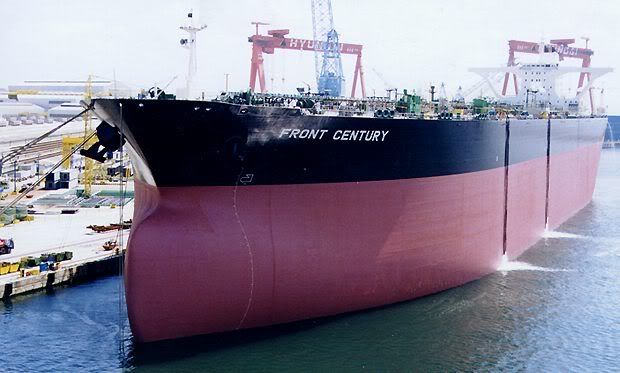Friday, August 04, 2006
Producing not just oil, but the ships to transport it.
Could this be in Venezuela's future?




Maybe.
I mentioned this the other day in the comments section but Venezuelanalysis wrote more on it and I think it is significant enough to merit its own post. Venezuela will apparently be getting into the ship building industry:
Of course there are lots of questions that would be nice to have answered about this. Where will the shipyard be built? What will be its capacity? When do they foresee it building its first ship? Are there Venezuelans with the necessary skills to run it? Will they build ships other than oil tankers? Will they leverage their contacts to get sales of these ships to other OPEC members and China?
Still I would like to be optamistic about this. I have actually always thought ship building would be a good thing for Venezuela to get involved with. I'm not sure why exactly, but I think because it is one of the most prominent industries that South Korea developed during its industrialization push and South Korea has always been a role model I would like to see Venezuela emulate. Rest assured, I will do everything I can to follow this closely and will update any new information on it as it becomes available. In the mean time, here is wishing this exciting new project much success.
|




Maybe.
I mentioned this the other day in the comments section but Venezuelanalysis wrote more on it and I think it is significant enough to merit its own post. Venezuela will apparently be getting into the ship building industry:
Venezuela and Brazil to Build Shipyard in Venezuela
By: Steven Mather - Venezuelanalysis.com
Caracas, Venezuela, August 3, 2006—The Venezuelan state oil company PDVSA yesterday signed a memorandum of understanding with Brazilian construction company Andrade Gutierrez SA to build a shipyard in Venezuela that would help maintain the 42 new oil tankers it intends to build by 2012.
This is all part of a wider diversification plan to reach new markets and to reduce the dependency on the international transport companies with their widely fluctuating prices, “PDVSA takes one step further towards exporting its crudes and derivatives and attractive prices in important markets such as those in Asia…and minimize our dependence on the international transport of hydrocarbons,” Chávez said.
Venezuela currently has sixteen tankers which transport only twelve per cent of crude exports. By 2012 it hopes to be producing 5.18 million barrels of oil a day as opposed to the current 3.3 million. The additional 42 tankers would mean that 45% of petroleum exports would be transported by state owned tankers. The project should begin next year and although the exact location has yet to be revealed it is expected to be in the east of the country.
PDV Marina will also explore the possibility of building three or four special vessels that would transport liquid natural gas that is expected to be exploited with Russian assistance within the next few years.
“Within ten years we will be witness to an unprecedented jump in the heavy and light industry of the country, allowing us to penetrate new markets in the maritime industry in line with the strategy of PDVSA and the national government,” he added
Asdrúbal Chávez, the Manager of Trade and Supply of PDVSA and President of PDV Marina, the subsidiary of PDVSA involved in the agreement, said that this would be the first time that cutting edge technology for the fabrication, maintenance and repair of tankers and offshore platforms has been introduced to Venezuela.
Andrade Gutierrez SA is an international leader in marine construction with 60 years experience. The Managing Director of Industrial Business Pedro Antonio Dias was satisfied with the agreement and recognized it as a step down the road of regional integration, “We celebrate working with PDVSA a contribution to the maritime development of Venezuela under the framework of the integration project.”
The project should not only mean the diversification of external markets. The national economy should benefit too, as supply industries will be required. PDVSA expects that factories involved in the manufacture of parts for the construction work will be generated as well as design centers. These new industries will not be temporary and will remain to service future contracts.
Of course there are lots of questions that would be nice to have answered about this. Where will the shipyard be built? What will be its capacity? When do they foresee it building its first ship? Are there Venezuelans with the necessary skills to run it? Will they build ships other than oil tankers? Will they leverage their contacts to get sales of these ships to other OPEC members and China?
Still I would like to be optamistic about this. I have actually always thought ship building would be a good thing for Venezuela to get involved with. I'm not sure why exactly, but I think because it is one of the most prominent industries that South Korea developed during its industrialization push and South Korea has always been a role model I would like to see Venezuela emulate. Rest assured, I will do everything I can to follow this closely and will update any new information on it as it becomes available. In the mean time, here is wishing this exciting new project much success.
|
